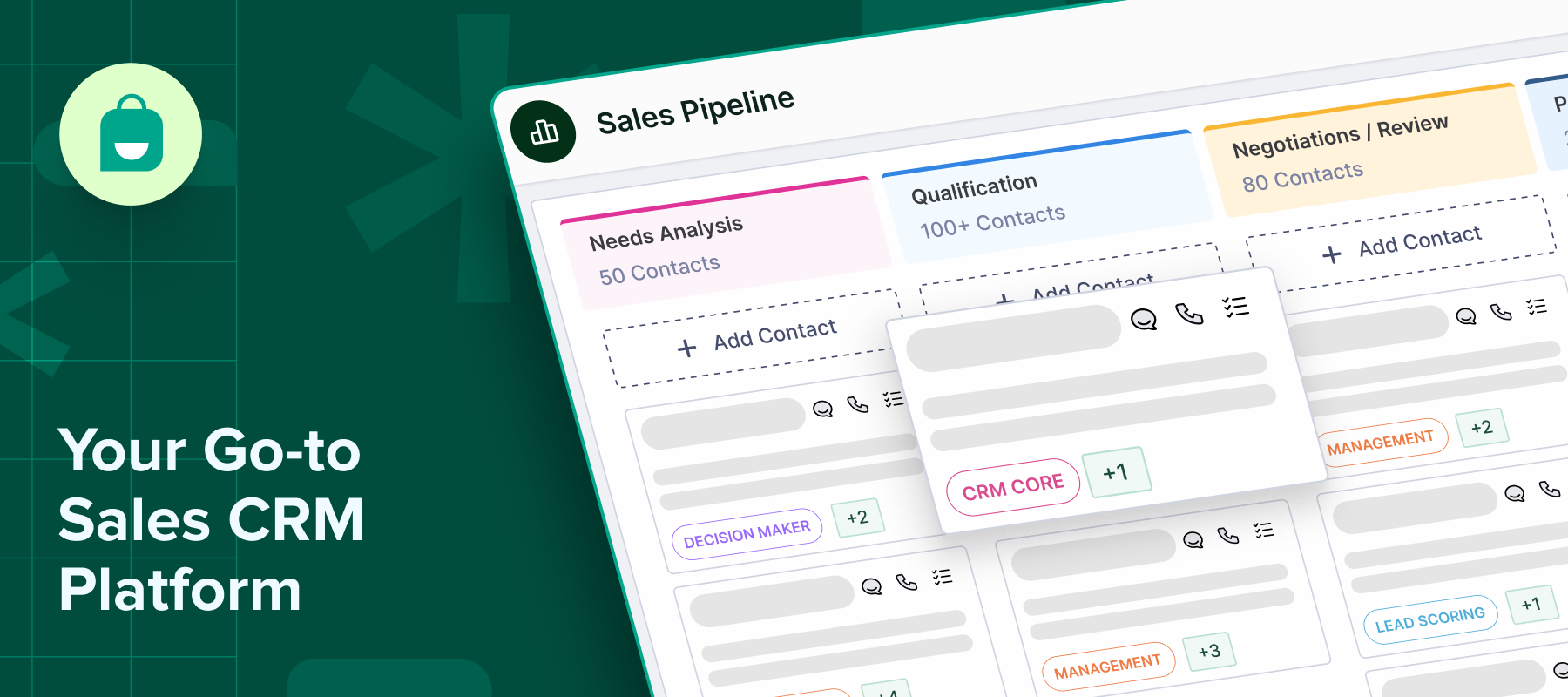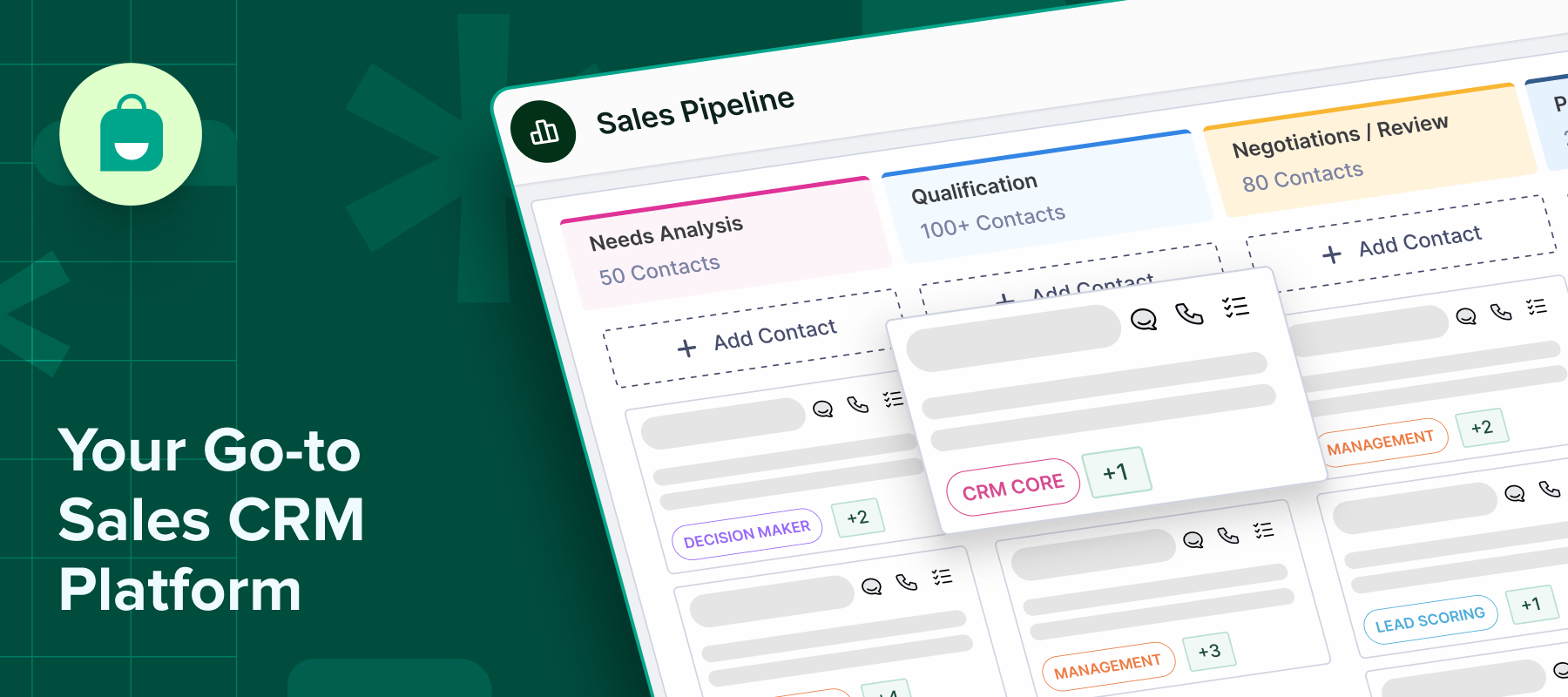For any business looking to grow and effectively manage customer relationships, a sales CRM is no longer optional. However, the best CRM for your sales team depends on where your business operates. This is because, depending on your location, the required features, applicable regulations, and compliance measures that you need to adopt can all vary significantly.
In this guide, we compare some of the top CRM tools in India and globally to help you find the CRM systems that fit your specific needs in 2025.
What makes a great sales CRM?
Before comparing global and local CRMs, let’s try to understand what exactly makes for a great sales CRM.
Ease of use and intuitive UI
A good CRM will be easy to navigate, allowing sales teams to quickly start with the tool without needing any heavy training. Having a clean, user-friendly interface is important as this can significantly boost day-to-day productivity for businesses.
Customizable sales pipeline and automation
Another feature that makes for a great sales CRM is the adaptability that it offers sales teams. Customizable pipelines and smart automation for seamless lead assignment, follow-up scheduling, etc., can help streamline processes and save time.
Integration capabilities
A great sales CRM will also be able to connect with tools that your team is already using, such as WhatsApp, email, or marketing platforms. This makes it easier for you to manage all interactions from a single place without switching between apps.
Data security, compliance, and cloud support
A competent CRM will also offer secure data handling and compliance with local laws (like GDPR or the Indian IT Act). Additionally, features like cloud support are essential as they ensure access to the tool from anywhere.
Reporting and real-time insights
Real-time dashboards and reports are another marker of a good CRM, as these features can help the sales team easily track performance, spot trends, and make quicker decisions, ensuring that sales efforts stay on track.
Top 5 sales CRM tools in India [2025]
These are the top five sales CRM tools companies can choose from in India:
Interakt
Built to help Indian businesses scale and grow their sales, Interakt offers a solution for WhatsApp-based lead management and customer communication. It is perfect for businesses that require a comprehensive CRM solution and are looking to scale with conversational selling.
Key features:
-Smart sales pipelines built for speed and clarity
-Automated, effortless lead generation and smart lead qualification
-In-depth real-time analytics and reports.
Zoho CRM
Zoho CRM blends powerful features with flexibility, making it a good choice for businesses of all sizes, belonging to any industry. Its strong features, built for Indian businesses, along with its global standards, make it another great choice.
Key features:
-Customizable sales workflows
-Built-in analytics and AI-powered insights
-Extensive integration ecosystem
Kylas
Kylas is another affordable and scalable CRM option perfect for Indian startups and growing businesses. With its intuitive interface and value-driven pricing, it is a top choice for businesses looking to stay on top of sales without complexity.
Key features:
-Unlimited users at reasonable pricing
-Pipeline automation features
-Local onboarding and support
Top 5 global sales CRM tools [2025]
Here are some of the best global sales CRM tools available on the market:
HubSpot CRM
Among the global CRM options, HubSpot is a popular tool among growing businesses, with its free plan that offers strong marketing, sales, and service features.
Key features:
-Minimal setup and intuitive UI
-Integration with HubSpot’s marketing tools
-Free plan with scalable paid upgrades
Salesforce
Salesforce is another top choice for large, complex organizations. It offers a great amount of flexibility and can be adapted to any sales process with deep configurations.
Key features:
-Automation and reporting capabilities
-Massive app marketplace
-Support for enterprise security and compliance
Pipedrive
Pipedrive focuses on enabling sales teams to close more deals through visual pipelines and automation tools. Its lightweight nature and powerful features make it ideal for any sales-focused workflow.
Key features:
-Drag-and-drop sales pipeline interface
-Built-in sales automation
-Email tracking
India vs Global CRM tools- A side-by-side comparison
Now let’s compare Indian and global CRMs based on the following criteria:
Pricing
Indian CRMs often come with affordable plans and offer solid features at lower prices. Global CRMs, on the other hand, follow standard international pricing, offering a lot of good features, but might stretch the budget for smaller teams.
Language and regional support
Local CRMs often support regional languages and come with simple, user-friendly interfaces. Global tools usually offer only major international languages, limiting accessibility for some Indian teams.
Customer support response time and availability
Indian CRM solutions typically offer support during local business hours along with region-specific assistance. Global CRMs, on the other hand, provide structured support based on service tiers, often with global coverage.
Data localization and compliance (GDPR vs. Indian IT Act)
Global CRMs focus on international standards such as GDPR, and in some cases, region-specific compliance measures as well. Indian CRMs are built to comply with local regulations like the IT Act, ensuring regional data alignment.
Integration with local payment gateways and tools
Indian CRMs can integrate smoothly with tools like Razorpay, Tally, as well as Indian eCommerce platforms. Global CRMs will require third-party connectors or extra setup to support these local platforms.
Factors to consider before choosing a CRM
Here are a few factors to consider before you finally double down on a CRM tool for your business:
Team size and technical skills
Smaller or less technically skilled teams usually will need a CRM that is simple to use and easy to set up. Larger teams, on the other hand, might benefit more from advanced tools, deeper customization, and wider feature sets.
Preferred communication channels
Depending on what channel your team uses for communication (WhatsApp, email, phone calls, etc.), choose a CRM that integrates seamlessly with it.
Sales process complexity and reporting needs
For simpler sales cycles, a basic CRM might do the trick. But for more complex processes, businesses will need advanced features like custom pipelines, automation, in-depth reporting, etc.
Budget flexibility and long-term growth
You also need to check if the CRM fits your current budget, while also being capable of scaling as you grow. Look for transparent pricing and upgrade paths that won’t potentially disrupt your workflow later.
Need for local support vs. global scalability
If your team operates mainly in India, you will need a CRM that offers local support and compliance with Indian data protection and privacy laws. For businesses looking to scale globally, a global CRM that can handle multiple regions and regulations is needed.
What Indian businesses prefer- Local or Global CRMs?
There are a few factors that greatly influence the CRM preferences of Indian businesses. Let’s take a closer look at these key features:
Cost vs. feature balance
Indian businesses often look for CRMs that offer maximum value at an affordable price. So, tools that balance core features like lead tracking, automation, and analytics without steep pricing are often preferred.
Localization and regional language interfaces
Indian businesses also look for CRMs with support for Indian languages or region-specific settings to help teams work more comfortably.
Customer service responsiveness
For many businesses, a CRM’s ability to provide prompt support in the Indian time zones is a decisive factor. Businesses often tend to prioritize CRMs that offer quick resolution through live chat, calls, or email, especially when sales teams need real-time help.
Ease of onboarding and training
Simplicity and quick adoption are key for most Indian businesses. Hence, CRMs that offer a smooth onboarding process with guided setup, local training sessions, or easy-to-follow tutorials are often favored.
Integration with Indian platforms
In the Indian market, businesses tend to look for CRMs that can connect seamlessly with tools such as Tally, RazorPay, etc., as they are more practical for day-to-day operations.
Conclusion
Between Indian and global options, choosing the right CRM can boil down to where your sales team is based and what tools they are comfortable with, as the feature requirements and compliance needs can vary based on location.
Looking for a simple, powerful, scalable, WhatsApp-focused sales CRM that is built to help Indian businesses grow?


